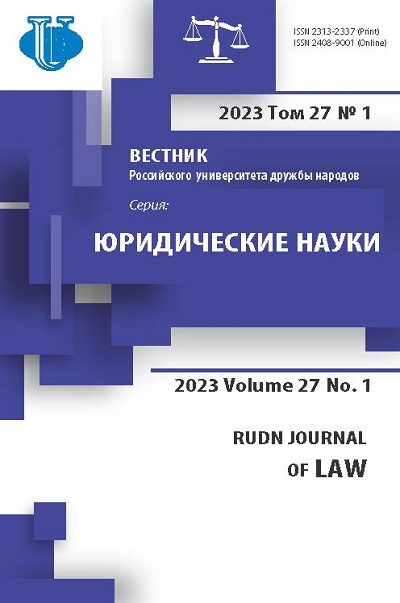Трансформация корпоративного права: квазикорпоративные и квазипубличные структуры
- Авторы: Новикова О.В.1
-
Учреждения:
- Национальный исследовательский университет «Высшая школа экономики»
- Выпуск: Том 27, № 1 (2023)
- Страницы: 181-199
- Раздел: ГРАЖДАНСКОЕ ПРАВО
- URL: https://journals.rudn.ru/law/article/view/34064
- DOI: https://doi.org/10.22363/2313-2337-2023-27-1-181-199
- ID: 34064
Цитировать
Полный текст
Аннотация
Цель исследования - изучение трансформации корпоративных отношений и корпоративного права, в свете размывания границ фирмы и развития цифровых коммуникаций и культуры стартапов. Результаты и выводы получены на основе общенаучных и частно-научных методов исследования. Рассматриваются примеры квазикорпоративных и квазипубличных структур, создаваемых с помощью: (1) соглашений с отложенной передачей акций (SAFE), (2) краудинвестиционных соглашений, (3) компаний-посредников для выхода на публичный рынок (SPAC), (4) бирж для частных компаний. Обозначены проблемы, возникающие в связи с регулированием квазикорпоративных и квазипубличных структур в России и за рубежом, намечены пути и области теоретического осмысления поставленных вопросов. С появлением трансграничных гибридных корпоративных структур на стыке долгового и акционерного, публичного и частного финансирования текущие дебаты о задачах корпоративного права и целях корпорации приобретают новый ракурс, так как сами границы корпорации становятся подвижными. При этом процедуры принятия решений опосредуются третьими лицами и цифровыми технологиями с перспективой возникновения конфликтов интересов и регулируются, в том числе формирующимися «снизу» стандартами. В цифровую эпоху существенно облегчается процесс создания и трансформации корпоративных структур. В цифровую эпоху гибкость в выборе элементов структуры позволяет «открепиться» от текущего государственного корпоративного регулирования и «прикрепиться» к нему в нужном месте и в нужное время. Сделан вывод о том, что взрывной рост гибридных структур формирует новые области развития правового регулирования при отказе от дихотомии «мягкого» и «жесткого» права. Среди векторов трансформации отмечены возрастающее значение частноправовых унификаций, развитие теоретического аппарата на базе концепции транснационального права, выделение его подсистем, в том числе lex corporatoria. Среди задач lex corporatoria постулируется формирование стандартов и обычаев в области корпоративных финансов, как нормативной основы функционирования рассмотренных гибридных структур.
Ключевые слова
Об авторах
Ольга Владимировна Новикова
Национальный исследовательский университет «Высшая школа экономики»
Автор, ответственный за переписку.
Email: mailandlaw@gmail.com
ORCID iD: 0000-0002-0546-6059
кандидат юридических наук, доцент департамента правового регулирования бизнеса
Российская Федерация, 109028, г. Москва, Большой Трехсвятительский пер., д. 3Список литературы
- Абашидзе А.Х., Гуляева Е.Е., Трикоз Е.Н. Техника и практика международного нормотворчества: обзор материалов Международной конференции ESIL // RUDN Journal of Law. 2022. Т. 26. № 2. С. 508-527. https://doi.org/10.22363/2313-2337-2022-26-2-508-527
- Adhami, S., Gianfrate, G. & Soda, G. (2018) Private Capital Marketplaces and IPOs. In: The Oxford Handbook of IPOs. Edited by Douglas Cumming. Oxford, Oxford University Press, pp. 696-719.
- Белов В.А. Международное торговое право и право ВТО. М.: Юрайт, 2020.
- Bernthal, J.B. (2018) The Evolution of Entrepreneurial Finance: A New Typology. Brigham Young University Law Review. (4), 773-858.
- Ciepley, D. (2020) The Anglo-American misconception of stockholders as ‘owners’ and ‘members’: its origins and consequences. Journal of Institutional Economics. 16 (5), 623-642. https://doi.org/10.1017/S1744137419000420
- Coyle, J.F. & Green, J.M. (2018) The SAFE, the KISS, and the Note: A Survey of Startup Seed Financing Contracts. Minnesota Law Review Headnotes. (103), 42-66.
- Green, J.M. & Coyle, J. (2016) Crowdfunding and the not-so-safe SAFE. Virginia Law Review Online. (102), 168-182.
- Greenspan, R. (2021) Money for Nothing, Shares for Free: A Brief History of the SPAC. Available at SSRN: http://dx.doi.org/10.2139/ssrn.3832710 [Accessed 12th July 2022].
- Guseva, Y.A. (2021) Conceptual Framework for Digital-Asset Securities: Tokens and Coins as Debt and Equity. Maryland Law Review. 80 (1), 166-213.
- Hooghiemstra, S.N. (2020). The European Crowdfunding Regulation - Towards Harmonization of (Equity-and Lending-Based) Crowdfunding in Europe? Available at: SSRN http://dx.doi.org/10.2139/ssrn.3679142 [Accessed 12th March 2022].
- Hornuf, L., Klöhn, L. & Schilling, T. (2018) Financial contracting in crowdinvesting: Lessons from the German market. German Law Journal. 19 (3), 509-578. https://doi.org/10.1017/S2071832200022781
- Johnston, A. & Talbot, L. (eds.). (2020) Great Debates in Commercial and Corporate Law. Red Globe Press.
- Katelouzou, D. & Zumbansen, P. (2020) The New Geographies of Corporate Governance. University of Pennsylvania Journal of International Law. 42 (1), 51-153.
- Казаченок О.П. Привлечение инвестиций с использованием инвестиционных платформ (краудфандинг): направления развития правового регулирования // Вестник Университета имени О.Е. Кутафина. 2020. № 8 (72). C. 74-85. https://doi.org/10.17803/2311-5998.2020.72.8.074-085
- Новикова О.В. Стандартизация условий венчурных сделок в США и формирование Lex Corporatoria // Актуальные проблемы права и экономики в ракурсе междисциплинарных научных исследований как формы международного сотрудничества: монография / под общ. ред. Блажеева В.В., Егоровой М.А. М.: Проспект, 2022. C. 293-305.
- Новикова О.В. Стандартизация сделок M&A в США и Европе: эмпирические исследования и концептуальный анализ // Lex Russica. 2021. № 9 (178). С. 131-143. https://doi.org/10.17803/1729-5920.2021.178.9.131-143
- Новикова О.В. Условия краудинвестиционных cделок и формирование lex corporatoria // Журнал предпринимательского и корпоративного права. 2021. № 3 (23). С. 23-33.
- Новоселов М.А. Применение lex constructionis в России для регулирования договора международного строительного подряда // Проблемы экономики и юридической практики. 2014. № 4. С. 104-107.
- Петрова Г.В. Международное платежно-расчетное право: современные тенденции развития // Проблемы экономики и юридической практики. 2017. № 3. С. 105-108.
- Ronnegard, D. & Smith, N.C. (2018) Shareholder Primacy vs. Stakeholder Theory: The Law as Constraint and Potential Enabler of Stakeholder Concerns. Available at SSRN: http://dx.doi.org/10.2139/ssrn.3165992 [Accessed 27th July 2022].
- Шахназаров Б.А. Комплексная взаимосвязь блокчейн-технологии и объектов интеллектуальной собственности в трансграничных частноправовых отношениях // Право. Журнал Высшей школы экономики. 2019. № 5. С. 121-147.
- Shneor, R., Zhao, L. & Flåten, B.-T. (eds.). (2020) Advances in Crowdfunding: Research and Practice. Cham: Springer International Publ.
- Суханов Е.А. Сравнительное корпоративное право. М.: Статут, 2014. 456 с.
- Вилкова Н.Г. Типовые контракты в XXI веке: настоящее и будущее // Арбитраж и регулирование международного коммерческого оборота: российские, иностранные и трансграничные подходы. Liber Amicorum в честь 70-летия АС Комарова. М.: Статут, 2019. С. 164-165.
- Zumbansen, P. (ed.). (2020) The Many Lives of Transnational Law: Critical Engagements with Jessup’s Bold Proposal. Cambridge University Press.
Дополнительные файлы















